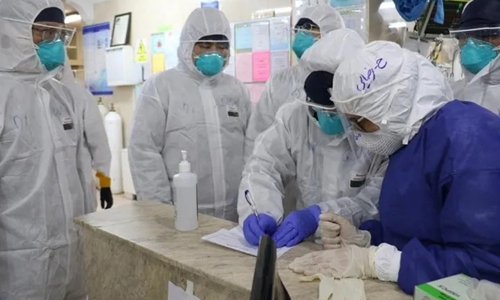HOME >> CHINA
China shares TCM experience with Tehran to combat COVID-19
By Li Qiao and Li Lei Source:Global Times Published: 2020/3/11 20:18:40

A volunteer medical team sent to Iran by the Red Cross Society of China visits a hospital for investigation. Photo: Courtesy of the Red Cross Society of China
Chinese medical volunteers dispatched to Iran have shared their experience of using traditional Chinese medicine (TCM), which has been proved effective, in preventing mild cases of COVID-19 from developing into severe ones. TCM is expected to be promoted among the treatment of COVID-19 pneumonia patients in the Middle Eastern country.
The Red Cross Society of China (RCSC) has sent medical teams to Iran and Iraq to help fight COVID-19, and also dispatched medical staff to Italy, Chen Zhu, president of the RCSC, told the Global Times on Tuesday.
A volunteer group of five health experts arrived in Tehran, capital of Iran on February 29 with medical supplies, according to a video conference held on Tuesday by the RCSC.
Iranian hospitals and officials asked the Chinese team to provide documents on the clinical experience of convalescent plasma therapy and TCM before adopting these therapies, said Zhou Xiaohang, who is the head of the expert team to Iran, at the video conference.
Iran says it will conduct clinical trials before pushing forward with TCM after it has been confirmed to be effective, according to the conference.
Gao Fu, head of the Chinese Center for Disease Control and Prevention, who also attended the conference, said Chinese experts will collect the current papers on clinical experience and China's therapy scheme, and translate them into Persian for Iran.
Significant effect
Lei Genping, a deputy director of the Affiliated Hospital of Shaanxi University of Chinese Medicine, told the Global Times that the advantage of TCM is its remarkable curative effect in treating COVID-19 patients.
Lei is also the captain of the medical team supporting Wuhan's Jiangxia Fangcang makeshift hospital, which is the only TCM makeshift hospital in China that accepted patients with mild cases of COVID-19.
In other makeshift hospitals, the percentage of mild cases turning severe ones ranges from 5 to 13, while not a single one in the 564 cases received in Jiangxia Fangcang hospital turned severe, Lei said.
Wen Minyong, the captain of a medical team supporting Wuhan from the First Affiliated Hospital of Guangzhou University of Chinese Medicine, told the Global Times on Tuesday that the inpatient area his medical team took charge of received 119 patients, and 109 of them have been discharged after accepting TCM treatment. The rest are expected to be discharged in the next two days.
"Most of our patients were of severe and critical symptoms, and we turned their cases mild and cured them (after treatment)," said Wen.
In 2003, when the severe acute respiratory syndrome broke out in South China's Guangdong Province, the 73 infected patients received by Wen's hospital all survived without being transferred to other hospitals, and no health care workers were infected.
Different with Western medicine, TCM does not kill viruses, but restores organ's functions and reinforces immune systems to fight against viruses.
Regarding the treatment of COVID-19 patients, no anti-virus medicine has been found to be significantly effective, while TCM has seen a good result in preventing mild cases from becoming severe and critical ones, said Wen.
Wen is confident TCM will achieve positive results as TCM treats patients based on syndrome differentiation. "Different patients show different symptoms even when they are infected with the same virus. TCM customizes patients' prescriptions based on their constitutions and symptoms," said Wen.
Challenge and opportunity
"When we promoted TCM therapy in Wuhan, community residents were initially reluctant to accept it. After witnessing TCM's effectiveness, people were happy to accept it," Tong Xiaolin, an academician of Chinese Academy of Sciences and head of the treatment group of the Natioanl Administration of TCM, said at the video conference.
Different from Western countries, Iran does not have the preconceived bias against TCM, but it just does not understand it, Li Weijian, vice president of Middle East Institute of China, told the Global Times. He said that once Iranians recognize that TCM is indeed effective in preventing the epidemic, they will accept it.
"Iranians are very focused on results," he noted.
Wang Chen, a senior respiratory physician and president of the Chinese Academy of Medical Sciences, expressed his concern at the conference that it is difficult for some Iranians to accept the bitter taste of TCMs and pointed out capsules may be easier to take than instant granule.
China should show the successful clinical cases of TCM therapy in detail and translate relative research reports into Persian to boost awareness.
"Translation will be a problem," Lei told the Global Times, fearing that improper translation may not adequately convey TCM's benefit in other countries.
"Literal translation is far from enough to express the essence and culture behind the (TCM) terms," he said.
Supporting Iran with TCM is a challenge as well as an opportunity, said Lei. He said the remarkable effect of TCM in fighting against the COVID-19 in China will speak aloud for itself.
To make suitable TCM treatment plans, prior surveys should be conducted to know their syndromes before sending a TCM physician team to Iran as different people in different environment show different symptoms, he suggested.
RELATED ARTICLES:
Posted in: IN-DEPTH